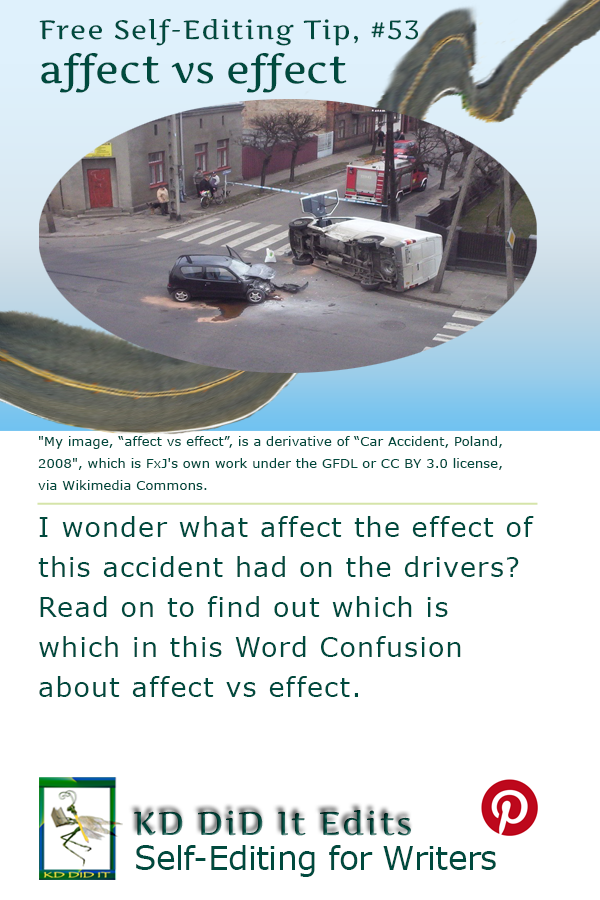This is a tricky one as they both can have an affect on the effect you are attempting. Yeah . . . which one to use, which one to use, hmmmm . . .
Is it possible to effect the affect? Or affect the effect? The truly scary bit is that either word can be a noun or a verb. Fortunately, using affect as a noun is generally restricted to a very limited field.
A good general rule is affect is the verb while effect is the noun. You may also want to peek in at “Affective versus Effective“.
Word Confusions . . .
. . . started as my way of dealing with a professional frustration with properly spelled words that were out of context in manuscripts I was editing as well as books I was reviewing. It evolved into a sharing of information with y’all. I’m hoping you’ll share with us words that have been a bête noire for you from either end.
If you found this post on “Affect versus Effect” interesting, consider subscribing to KD Did It, if you’d like to track this post for future updates.
| Affect | Effect |
|---|---|
 |
|
| Part of Grammar: | |
| Noun 1; Verb, transitive 2, 3
Plural for the noun: affects Third person present verb: affects |
Noun; Verb, transitive
Plural for the noun: effects Third person present verb: effects |
| Noun: [Psychology] Emotion or desire, especially as influencing behavior or action 1 When speaking about psychology with reference to someone’s mood. (Psychologists know that you can never really understand what someone else is feeling. You can only know how they appear to be feeling.) Be warned that affect as a noun is almost entirely restricted to psychology. Verb, transitive: To act in a way that you don’t feel Have an effect on Make a difference to
Pretend to have or feel something 3
|
Noun: A change that is a result or consequence of an action or other cause
[Effects] The lighting, sound, or scenery used in a play, movie, or broadcast [Effects] Personal belongings Verb, transitive: Cause something to happen |
| Examples: | |
| Noun: She displayed a happy affect. Verb, transitive: The rain affected Amy’s hairdo. She affected an air of superiority. The dampness began to affect my health. Your attitude will affect how successful you are. The atrocities he witnessed have affected him most deeply. As usual I affected a supreme unconcern. A book that affects to loathe the modern world. He was an American who had affected a British accent. |
Noun: The effect was eye-popping. The sound effects were amazing. Her face shows the lethal effects of hard drugs. Politicians really do have some effect on the lives of ordinary people. Wind power can be used to great effect. The Doppler effect is when something sounds louder as it approaches you and sounds fainter as it goes away. Gentle music can have a soothing effect. The production relied too much on spectacular effects. Thank god our insurance covers personal effects. Verb, transitive: Nature always effected a cure. Budget cuts were quietly effected over four years. |
| Derivatives: | |
| Adjective: affective, affectless, nonaffective Adverb: affectively Noun: affectivity, affectlessness |
Adjective: effective Adverb: effectively Noun: effectivity, effectiveness |
| History of the Word: | |
|
Late Middle English from the Old French or from the Latin effectus, which is from efficere meaning accomplish, from ex- (out, thoroughly) + facere (do, make). |
C’mon, get it out of your system, bitch, whine, moan . . . which words are your pet peeves? Also, please note that I try to be as accurate as I can, but mistakes happen or I miss something. Email me if you find errors, so I can fix them . . . and we’ll all benefit!
Satisfy your curiosity about other Word Confusions on its homepage or more generally explore the index of self-editing posts. You may also want to explore Book Layout & Formatting Ideas, Formatting Tips, Grammar Explanations, Linguistics, Publishing Tips, the Properly Punctuated, Writing Ideas and Resources, and Working Your Website.
Resources for Affect versus Effect
Apple Dictionary.com
Fogarty, Mignon. “Affect versus Effect.” Grammar Girl Quick and Dirty Tips. 7 July 2016. Web. n.d. <https://www.quickanddirtytips.com/articles/affect-versus-effect/>.
Pinterest Photo Credits:
Car Accident, Poland, 2008 is FxJ’s own work under the GFDL or CC BY 3.0 license, via Wikimedia Commons.
Revised as of 30 July 2022
By: Kathy Davie

